#travis' masculinity is SUCH an important aspect of his character
Explore tagged Tumblr posts
Text
and if i said the idea of transfem travis has really taken hold of me? like being able to explore gender in the wilderness surrounded by different types of girls and gender presentations and focusing more on survival than what's "proper", without the judging eye of society (or family). and getting snapped back to reality in the 90s and expected to be something completely different by the rest of the world. not just trauma but a constant reminder that the world you came back to doesn't fit anymore. falling back into old habits but worse, and still never willing to give it all up because of knowing what was sacrificed. but also knowing what could be and living in silent agony about it. i too would change my identity and fall off the grid and drown myself in booze and drugs
#[ ch: travis martinez. ]#[ hc. travis martinez. ]#i just really love the idea of travis being 'one of the girls'#like just full on acceptance for the first time in his life... until it gets ripped away#idk iDK it's been literal months since i've started thinking about this#travis' masculinity is SUCH an important aspect of his character#but i can see that struggle with gender so clearly through that lens#everyone else gets to shed expectations out there so why can't travis#this might be my most 'radical' take#anyways still not really here but always kinda lurking lol
3 notes
·
View notes
Note
imma be so honest, i dont like travnat and most of us don’t bcs travis is male- everyone would eat that shit up if it was wlw. im not even ashamed to say it but listen, y’all can dislike a ship or a character but to say they are badly written is a stretch and simply not true
I’m totally guilty of this, too. I’m a lesbian, and I certainly want to see more lesbian relationships in my favorite shows and movies. I HATED Travis and Travnat on my first couple of watches, and I think a lot of that had to do with Travis being a man and a straight relationship being so prominent in the show in the place of what could be more queer representation. But I totally understand the people who dislike Travnat more because he is a man, it makes sense that it is more uncomfortable to see a man slut-shame and point a gun at a woman than it is to see a woman do so. I love Lottienat but I don’t think I would love it as much if Lottie was a man grabbing Nat with the knife during Doomcoming, or if Nat was a man telling Lottie she should “say less.” That’s just the anger and discomfort associated with a long history of misogyny and men’s abuse towards women, so I get that aspect. Toxic wlw is a lot more fun than straight toxicity.
But I agree, you definitely cannot say that Travnat is poorly written. Travnat grew on me over time because of how well-written and realistic it is. I love that they are the only people who can ever truly understand each other but are also the source of each other’s self-destruction. They are birds of a feather but that also means they have the same unhealthy coping mechanisms and relationship patterns. There’s a heartbreaking push and pull in their relationship of reaching out to each other and then lashing out and hurting each other because neither of them know how to accept love. And Nat replacing her drug addiction with an obsession with Travis in the wilderness makes so much sense. You can hate Travnat but you can’t say that Nat didn’t love that boy. She canonically says he was her best friend, the only person who ever truly knew her, and the only person she ever loved. Those are words straight from her mouth in that scene with Lisa. Ugh I love them and could go on about how narratively fascinating their relationship is for ages but I’m going to restrain myself.
And as much as people say there are too many men in this show, I do think including men (particularly Travis) in this story has been valuable. I have appreciated being able to see how a man plucked from a patriarchal society has changed and evolved when placed in a female-dominated environment. An important element of this show is watching the ways of civilization and society slowly dissolve, and part of that is seeing how Travis transforms from toxically masculine to releasing society’s expectations and developing more gentle and emotionally expressive feminine qualities. And watching how he comes to respect female leaders in the group like Lottie. And watching how traditional gender roles shift in his relationship with Nat. With men being included in the story, we get to see how societal gender norms can shift in this lawless environment, and I think that’s really interesting.
Sorry that was way longer than I intended it to be I woke up in a yapping mood.
27 notes
·
View notes
Text
LGBTQ+ Percy Jackson Headcannons
Hello everyone, I hope everyone’s day is going good. I wanted to do these headcannons for so long and I was waiting for Pride Month but fuck it, I want to do them. Love is Love and don’t let anyone tell you otherwise because your valid and amzing the way you are! Spoilers for TOA, Jason’s not dead!
- Percy Jackson is bisexual
- He’s less of a leader of the camp and more like the big brother. Most campers go to him to come out because he’s such a supportive person and such a great listener.
- If that camper has a crush on another camper and Percy knows that other camper likes them back, Percy along with the help of Piper get them togther.
- Bisexual Piper (or Pan)
- The Aphrodite Cabin help curious or confused campers figure out there sexuality or gender. They know pretty much know all sexuality’s and genders and help.
- If there’s a camper who dose not identify what there assigned gender at birth is, the Aphrodite cabin helps them feel more masculine, feminine, both or neither. They will give them clothes that they like because they have the biggest closet in Camp. They give makeup and tips, if someone wants to cut there hair, they will cut it. They just like to make people feel beautiful, handsome, or both.
- If there’s an asexual or aromatic Aphordite kid who thinks something is wrong with them, there siblings tell them that there vaild and loves them so much.
- Aphrodite is so supportive of her kids. She wants them to love whoever they want and even if they don’t, she’s still happy for them. Sometimes if one of her kids have homophobic mortal parents, she will go talk to that child and tell them that love is love and that there vaild for liking who the like.
- Aphrodite cabin team up with the Athena cabin to teach the camp about the different sexuality and genders. The Athena Cabin more specially teaches the history.
-Pansexual Annabeth
- Athena Cabin teaches and educated people on every aspect of the LGBTQ community. If someone is uneducated, they teach them. They teach the Camp about the history and how it’s important.
- They will have literal charts, graphs and even discussions and debates if a character in there favorite book is LGBT or not.
- Malcome Pace is gay.
He’s dating Conner Stroll and they didn’t really tell anyone because they lowkey forgot. Everyone just thought there were best friends. One night at the campfire, Conner comes to sit with Malcome because at this point, no one follows the rule. He kisses him on the the cheek and the Apollo kids stop singing. The whole Camp is in shock, and they both reliazed what happened.
- The Athena Cabin and Hermes Cabin were asking them so many questions like “When did you get togther”, “How did you get togther”, or “Why didn’t you tell us”. The Aphrodite cabin was just squealing because they shipped them for so long. Everyone was asking questions. Mr.D was like “Ha, called it”, Malcome and Conner both said that “They just assumed everyone knew”, like did the camp see how close they were?
- Travis is so happy for his little brother, and supported them so much. Katie Gardener is happy for Conner because even though they get on each other’s nerves, Conner deserves someone who loves him as much as Travis loves her. Annabeth is so happy for her little brother. She asked “When did you two get togther?” They both replied with “8 months ago”. The entire Camp gose nuts of that fact that Malcome Pace and Conner Stroll got togther eight months ago without anyone knowing.
- In Olympus, Hermes keeps gloating to Athena that one of his kids is with hers.
- Back at Camp, the counselors are ready to do the normal Camp tradition when a new couple gets togther. Conner and Malcome know what’s coming, the Aries kids pick them up and dump them into the lake. It’s a tradition that started with Percebth.
- Conner’s gay
- The Aries Cabin are a little weary of the community but after one of there siblings come out, they become so protective of them.
- Pansexual Will
- During Pride Month, every single day during the Campfire, the Apollo cabin sing LGBTQ anthems.
- They put on LGBT movies during Pride Month for movie night. Conner and Travis tried to sneak in R rated movies but got caught.
- Apollo being so bi as fuck when he’s at camp and encourages campers to come out.
- In fact all the Gods not caring what gender or sexuality there kid is and supports them. After all, the Greeks were never straight
- Hazel and Calypso being so confused about the community because they weren’t around when the terms were made. Annabeth and Piper help educate them on the community
- Hazel finding a term that identity’s with her because even though she loved Sammy and loves Frank but there were a few girls back home that she liked. She’s happy that it isn’t unnatural.
- Pansexual Hazel
- Frank being so supportive and happy that she found out a part of her.
- Bisexual Leo
- Also Trans Leo (FTM)
- Leo being trans and insecure about his identity because of some transphobic foster homes. Piper and Jason being the first people to know and slowly felt more comfortable it’s telling people.
- Leo’s terrified to tell Calypso because he’s scared she will leave him. He puts off for a long time and Calypso knows something’s up. After much encouragement from his friends, he finally decided to tell Calypso. He asks her on a date in Bunker Nine.
- It was a very enjoyable date and they had a great time. Leo was stalling and Calypso knew but didn’t push him. He finally spit it out and was braced for Calypso to be disgusted and leave him but instead she was confused. Calypso never really grasped the term and just asked questions. Leo was shocked at her reaction and explains to her and she understood a lot more and was fine with it.
- Leo was shocked and rambled on about how he dosen’t meet her expectation of a “cis guy” and Calypso cuts him off with a hug and tells him she loves him no matter what. Leo was on the brink of tears and they just stayed there for a while.
- A couple days later, Calypso made Leo a homemade binder using the same material that she used when she makes him fireproof clothes. Leo was very happy. (I can do more of Trans Leo if anyone wants any)
- The Hunt obviously accepts trans girls because trans girls are girls!
- Artemis also hunts transphobes for fun with the help of Reyna and Thaila.
- Meg curses out anyone who is homophobic or transphobic.
- Mr.D threatening to turn someone into a dolphin if he hears someone say something homophobic or transphobic. Chrion giving that person cleaning duties for a month after dinner.
- Rachel blasting out Girl In Red in her cave.
- Percy, Leo, and Piper blastes our Sweather Weather at 3am, in the Posiden Cabin, singing it in the top of there lungs
- There’s a support group in Camp Jupiter for the LGBTQ+ community and Hazel obviously joins. The group gladly accepts there praetor.
- The Demeter Cabin makes rainbow flower crowns during Pride Month.
- Sally Jackson makes rainbow cookies for Pride.
- The Hephuetus Cabin teams up with the Aphrodite cabin to make rainbow jewelry.
- During Pride Month, the Iris Cabin decorated the entire camp in rainbows, they had a whole celebration all month. Things like Pride songs every night or movies, accessories and flags and even a parade.
- Jason being the whitest, straightest, cisest, male out there and supporting all his friends no matter what. He takes them to Pride, donates to charitys and organizations for LGBTQ+ teams or adults. Jason educates himself and will be there every step of the way. Calypso and Frank also being huge supporters!
- Nico being so happy that things have changed and he’s finally in an environment where he is accepted and loved. Will loves seeing his boyfriend smile.
- At the end of the month, the Hephuetus Cabin puts out a rainbow firework show, showing how everyone is accepted no matter what.
I can make a Part two if any wants
#percy jackon and the olympians#heroes of olympus#trials of apollo#pjo#hoo#toa#lgbtq#queer pride#percy jackson#annabeth chase#jason grace#piper mclean#hazel levesque#frank zhang#leo valdez#nico di angelo#will solace#rachel elizabeth dare#lester papadopoulos#apollo#malcolm pace#conner stoll#reyna avila ramirez arellano#thalia grace#caleo#solangelo#frazel#jiper#percebeth#meg mccaffrey
445 notes
·
View notes
Note
Hi! Can I ask question about the movie Paris Texas? I am not sure if youre the right personbut i have always wondered why it is so highly revered. Like I liked the movie, i thought it was good. i could feel the longing the characters are going through, i liked how it was shot(?),i can see why the 'booth' scenes are always replicated in music vids & other shows & stuffBut idk what makes it iconic- like everytime i listen to people talk about films, they bring that movie up.
my favorite actors and directors for around the world even mention that filmLike i enjoyed it and know its good, but i am not sure on what makes it great. what are your thoughts on this film?
ahh hello! lmao im so happy people are asking me to talk about film lmao this really does excite me. and im so glad you came to me with this! just in general! thank you!
trust me like...i get it. paris texas is a great film, and i did enjoy watching it, but i see where you come from. i can understand why its been so revered, so hopefully i can shed some light on that for you. but! i really do understand where you come from. if im honest, theres a lot of flaws and issues with the film. its slow, doesnt actually handle the heavy themes the script attempts to portray very well, and doesnt really actually offer any nuance to janes character. shes actually a really complex character, but shes boxed into the role of like...the manic pixie dream girl, except not that. shes not and ideology of freedom or growth or perfection the way that trope is usually portrayed. instead she exists to further a male centric narrative and the depiction of women is really shallow, so trust me i get why there is a dissenting opinion.
that said, there are a lot of things that make the film as cult and important as its become among cinephiles. they range from the use of americana as a plot device, colour theory, voyeurism, the breakdown of the american dream, etc. ill be breaking down some of the major points here under the cut, but there are even more ways to read this. and!! i stress!! it is ok to read all of this and still disagree! thats the beauty of film studies.
to really understand fundamentally why this film is so important we need to focus on two intertwining notions - that the film is a portrayal of america and this portrayal of a america is coming from a foreigner. the director of the film is win wenders, a german filmmaker, who has always claimed to be fascinated by the history and character of america. effectively, america itself becomes a character within the film. it does not matter that ‘america’ is the backdrop - it plays such an integral role in shaping the narrative of the story, one could argue it has more autonomy than jane. take for example the opening scene - it opens with the scene of a man walking aimlessly through the desert with a gallon of water - nameless and aimless. from this very first moment, we are presented with land. an endless expanses of land in which there is no real ownership; from this moment, we are meant to understand this america shapes the lives of its people as much as this perspective on america is shaped by the director of the film.
furthermore, if we consider the opening shot; the saloon; the fact that a full 26 minutes elapses before the main character says a single word, we can argue the mise en scene within each of these scenes a visual alignment to the classic genre of western cinema. here, too, in this genre is the stress on land as it relates to and symbolizes the importance of freedom, autonomy, and identity, but moreover is there a stress on the notion of the anti-hero. by cultivating this understanding of america and the western, we can immediately align travis with the failed man, the failed husband, a failed owner of land, and a failed dream.
but...did he fail? or did the notion of americana and the american dream fail him, instead? this seems to be the case as we considered the continual use of americana references. one of the fundamental aspects of americana is the nature of nostalgia - americana is traditionally idealized as the desire to return to small towns and cities from the turn of the century. the hope of creating a home, only for that essence of home to be lost; the period of exploration from 1820 to 1880, and then the comfort of being settled from 1880 to WWII. these are the fundamental aspects to understanding americana but they are foundational in the nostalgia that drives the narrative. aspects like: a barber shop, a diner, route-66, etc these small town notions are the driving pieces of nostalgia. and these are the elements of nostalgia that generate the plot device of paris texas.
im taking a moment here to really stress the following: western films and the concept of americana is inherently problematic. it exists on wester colonization, appropriation, and genocide. americana is a white-washed version of history and that, explicitly, is why all the elements of americana, nostalgia, and the american dream fail within this film because, again, it is america from the perspective of a foreigner and the perspective is profoundly unforgiving.
(also, like, i literally hate western films because they are so racist and sexist and hyper-masculine, from any historical or modern perspective, so again...me being me saying i understand why you might have had a hard time with this movie lmao but when you realize this is not speaking in favor of those things it kind of hits you like...oh, damn. like, imagine this film from the perspective of a white american male, you know? travis would be a king, someone admired rather than someone youre not even sure you like or tolerate by the end)
right! so! now that we understand how important the elements of a failed america and american dream are to this film, we can see how nostalgia continually presents itself - not for a home lost, but for the hope and the opportunity lost. consider: the colour, the wide, open expanses of land (could have been owned, but are entirely empty), the way characters gaze at their own reflections - hell, the conversation between jane and travis at the end, double sided mirrors, jane forced to look at herself in the mirror while travis looks at nothing because its his memories and his memories are presented at a visual and emotional distance. memory presents itself through illusions, reflections, and disorganized narrative structures - it is not that they cant remember, but that they want to remember without criticism. this comes to a head when they view the home movies, another example of how life was or could have been - how it was supposed to be, and the sudden confrontation that it very much is not that.
primarily for me, the thing that makes me enjoy the film (apart from realizing wenders has an extremely unforgiving view of america) was the colour theory. you cannot talk about this film without discussing the colour. the predominant tones in the film are red, white, and blue - americana and american flag. but why all the green (i.e the doctors office)? why the isolated events of solid red (i.e the strip club)? well, green and red are put perpetually at odds with one another. green, a usually soothing colour, is subverted to denote internal conflict; red, becomes regret, falsehoods. the colours in the film exist to at a sub-textual layer that speaks for the characters when they refuse to speak for themselves. and by the end, the colours return to a normal palette. black, beige, tan - travis recounting their history to jane in a room that is natural. things are finally exactly as they are meant to be, the intense colours of their emotions faded by distance and time, and forced now to confront their truth.
but still...the elements of voyuerism exist. because he can see her...if he chose to. she cannot see him. she can only see herself. and so we are left, then, understanding that there is no hope. no connection. the achievement of the american dream is a falsehood of nostalgia that exists to drive our motivations, forcing us to live in a time or a place or a hope that never once was tangible, but craved just the same.
#i hope this helps you understand WHY its considered incredible#but remember theres a large number of films#EVERYONE obsesses over that i personally despise#this is just why#doesnt have to be right for you tho!#the joy of film#and any practice really#is the ability to praise a film you love and ensure it gets a place in history#if its great to you then it is great <3#ahgishaman
2 notes
·
View notes
Text
Mirror, Mirror: When Movie Characters Look Back at Themselves by Sheila O’Malley
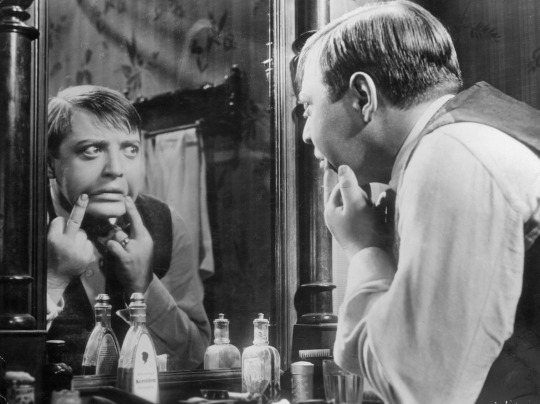
“I always feel it behind me. It’s myself. And I follow me. In silence. But I can hear it. Yes, sometimes it’s like I’m chasing myself. I want to escape from myself. But I can’t!” —Peter Lorre as child-murderer, M (1931)
There was a period in the ‘60s and ‘70s when you could barely call yourself a male movie star if you didn’t do a scene where you stared at yourself in the mirror, doing various “private” things. The device shows up before then, too, but the floodgates opened in the ‘60s and ‘70s. Meryl Streep has observed, “Often the scenes that are the most exciting, and most illuminating in film, are the ones with no dialogue…where a character is doing something alone, where the deepest most private self is revealed or explored. Exposed.”
Mirrors have multiple thematic uses (as well as the obvious directorial choice to add visual interest to the frame). But if a character is inarticulate, then seeing him “deal with” his reflection can fill in some gaps. It’s a great storytelling shortcut. If the character has a firm public “mask,” a “mirror scene” can let us see who he is when no one is watching. We all lie, to some degree, out there in the world (or on social media). We construct a “self” and a mirror scene allows the character to strip that away.
Speaking stereotypically (or, in archetypes), what is expected of male characters in terms of public persona is different from the pressures on female characters. Not better or worse, just different. Crying, showing uncertainty, weakness, vulnerability … can be a minefield. This is why the glut of male mirror scenes in the 70s makes a kind of sense: as the women’s movement rose, men began to wonder about their place, as well as buck against some of the gender norms imposed on them (or, in some cases, re-entrench said gender norms, Travis Bickle’s “You talkin’ to me” the most classic example).
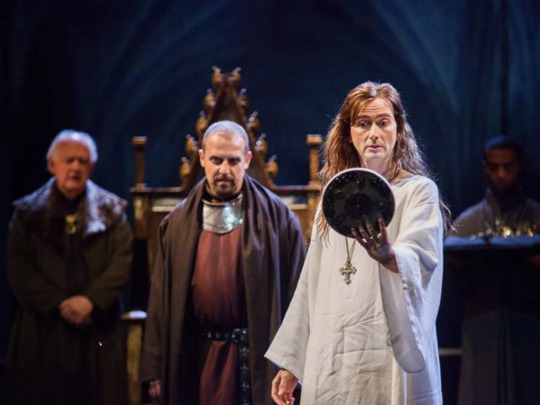
Shakespeare’s use of the soliloquy—in particular for Kings and prospective Kings—could be seen as mirror scenes, with the audience as the mirror. A man goes into a private space, showing the audience things he cannot show on the battlefield or in the court. Hamlet, one of the most introverted of Shakespeare’s characters, showing non-gender-norm qualities of uncertainty and sensitivity, has a massive six soliloquies. (“O that this too too solid flesh would melt”, “O what a rogue and peasant slave am I”, “To be or not to be”, “Tis now the very witching time of night”, “Now might I do it pat” and “How all occasions do inform against me.”) It is impossible to imagine the play—or Hamlet—without them. In Richard II, after Richard is forced to surrender his crown, what is the first thing he does? Like a true narcissist, he calls for a mirror. As he stares at himself, he wonders,
“Was this face the face That every day under his household roof Did keep ten thousand men?”
and throws the mirror on the ground.
Mirrors are powerful and mysterious symbols. The doubling-up can mean all kinds of things. Alice steps through the looking glass into another world. Goethe’s Faust looks into the witch’s mirror and sees a beautiful woman staring back. Dorian Gray takes a mirror to compare his face with the one in the attic portrait. (Like Richard III, Dorian smashes the mirror.) A mirror is crucial in Tennyson’s “The Lady of Shalott,” where “The Lady” is cursed to view the world only through a mirror. But then Lancelot rides by and she can’t help it, she has to sneak a peek. Maybe the most famous fictional mirror is the Evil Queen’s in “Snow White,” the one she asks every day, “Mirror, mirror, on the wall, who’s the fairest of them all?” Richard III doesn’t look for a reflection of his beauty. He wonders where his “self” even is, without the crown.
An early male mirror scene—and one of the best—is Peter Lorre’s in Fritz Lang’s M (1931). Our first glimpse of Lorre’s face comes without warning. As a handwriting-analyst theorizes in voiceover about the child-killer’s psychology, we see him, staring at himself in the mirror. He pulls at his face, slowly, manipulating his mouth into a smile, trying it on for size, maybe seeing what it looks like to the children he seduces. He bugs his eyes out, turning this way, that, a maniacal presence, almost like a shark rolling its eyes backwards as it attacks. He has no sense of what human beings feel like, of what he looks like, of how to even make a facial expression. It’s one of the most chilling private moments in cinema.
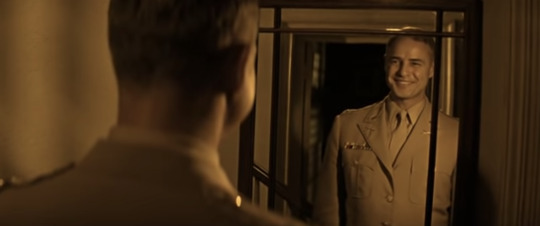
Speaking of “private moments”: Constantin Stanislavski wrote a lot about how actors needed to feel “solitude in public.” He wrote: ”During a performance, before an audience of thousands, you can always enclose yourself in this circle…You can carry it with you wherever you go.” Lee Strasberg developed his “private moment exercise” to help actors achieve “solitude in public.” There are things you do when you are alone which you would stop doing if someone walked in. Maybe you sing along to the radio. Maybe you talk to yourself. Maybe you pick your nose. Maybe you do all of these things simultaneously. Our “public” selves are drilled into us from a very young age. There are “good manners,” there are “contexts” to be memorized—what flies at home will not fly outside the home. Breaking down the public face, letting an audience see who you are when you are by yourself, is part of the actor’s job. (It’s not a surprise that the '70s came to be dominated by private-moment mirror scenes, considering the influence of the Strasberg method on acting styles.)
One of the most important mirror scenes, and a huge influence on Martin Scorsese, is Marlon Brando’s in Reflections in a Golden Eye, directed by John Huston. Brando plays Major Weldon Penderton, a closeted gay man married to a frustrated, luscious Elizabeth Taylor. Late at night, Penderton sits alone, staring at pictures of naked male statues from Greek antiquity. The character lives in an almost totally male world (the military), turned on by young soldiers, and terrified of revealing himself. In one scene, alone downstairs in the house, he walks into the hall and stares at himself in the mirror. After a moment of vacuity, he begins to talk to himself, or, more vulnerably, to an imaginary other person. He pretends to respond to what the other person says, he practices laughing, and he smiles, but the smile is superimposed. He can’t get it to look real. What he says is a kind of murmur, a “pretense” of conversation. This is the kind of vulnerability Brando could achieve like no other. Without this scene, the Major could have been a caricature. All we see is his fuddy-duddy sexless stiff public mask. The mirror scene shows his confusion at how to be a man, how to navigate even a casual conversation.
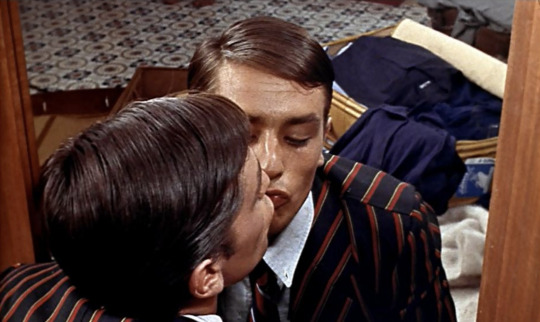
Alain Delon has a stunning mirror moment in Purple Noon (1960), Rene Clement’s adaptation of Patricia Highsmith’s The Talented Mr. Ripley. Delon plays the sociopath Tom Ripley, in thrall to his casually masculine friend Philippe Greenleaf (Maurice Ronet). Delon’s chilly presence onscreen works to beautiful effect: He doesn’t show us much. But then, he tries on Philippe’s clothes, a sleek pinstripe jacket, fancy shoes. He checks himself out in the mirror. Most actors would leave it at that. But Delon understood the homoerotic implications of the script, not to mention the character’s dangerous narcissism. Delon leans into the mirror and gives himself a rapturous long kiss, slitting his eyes open at one point, to check out what he looks like.
It’s interesting to contrast this with the same scene in the 1999 adaptation, The Talented Mr. Ripley, starring Matt Damon. Director Anthony Minghella makes the subtext practically text, by placing mirrors in almost every scene (the final shot of Ripley is through a mirror). When Ripley tries on his friend’s clothes, he dances around to Bing Crosby’s “May I,” doing a vaudeville burlesque. It’s a different kind of rapture than Delon’s swooning kiss. Damon’s drag-style dance is more for the audience, an explicit display of inner gay-ness, what Ripley is hiding beneath his good-natured submissive public persona. It’s a good scene, although I prefer Delon’s. Delon’s kiss is Stanislavsky’s “public solitude”—and it shows the terrifying void within the character. There is no self. The entire world is a mirror.
In Karel Reisz’s gritty Saturday Night and Sunday Morning, Albert Finney’s Arthur, in a whirl of work, sex, and alcohol, is suddenly caught by his reflection one hungover morning. He was beat up the night before. He plays at being a sniper through his window, targeting local women with pellets. It’s a thin line between playfulness and murderous acting-out. Finney digs into this aspect of the character when he suddenly speaks to his reflection. It is a statement of bravado before descending into confusion: ”I’m me and nobody else. Whatever people say I am that’s what I am not, because they don’t know a bloody thing about me. God knows what I am.”
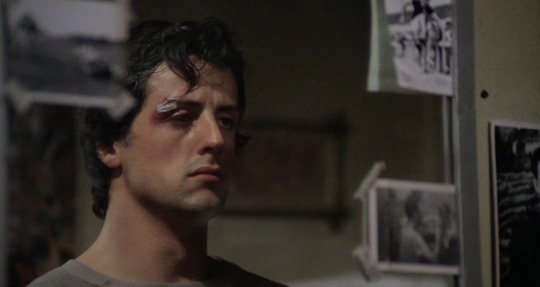
For the opening sequences of Rocky, we see Rocky Balboa’s normal “day in the life.” We are introduced to him through various public selves. But when he goes home to his dank apartment, feeding his turtles, gentle and quiet, his loneliness is so acute it reverbs off the screen. Childhood photographs of him line the mirror frame, and Rocky stares at them, his big-lug face almost crushed in disappointment. Holding a container of turtle food, he starts to talk to himself. What he’s saying doesn’t sound like anything, just private-moment murmurings, but in the next scene, when he goes to visit the girl in the pet store, it becomes clear. He was practicing a joke to tell her, a joke designed to make her laugh, show her he’s a safe person, he’s nice. Rocky practicing a joke in the mirror is one of Stallone’s most vulnerable moments as an actor (and evidence of his gift as a screenwriter).
John Travolta’s mirror moment in 1977’s Saturday Night Fever is star-making, not just because of Travolta’s almost otherworldly gorgeousness (as well as how he revels in said gorgeousness, behavior considered coded-female). Surrounded by 1970s icons—posters of Rocky, Serpico, and Farrah Fawcett—he blow-dries his hair, places gold chains around his neck, and stands like a superhero in his black speedo briefs, shot from below. Perhaps the most revealing thing about the scene is that when his father barges into the room, Travolta’s Tony Manero does not stop what he is doing. His lack of embarrassment tells us everything we need to know about the character.
Francis Ford Coppola’s epic, Apocalypse Now begins with a hallucinatory sequence showing a PTSD-rattled Martin Sheen, holed up in a hotel room in Saigon, tormented by memories. In one shocking moment, Sheen stands unsteadily, and lurches around in front of the mirror, flailing his arms out in imitation martial-arts moves, an attempt to combat his helplessness and anguish, his impotence. But the gap between reality and fantasy is too great, and he, like Richard III, smashes the mirror.
Richard Gere’s mirror moment in American Gigolo is a distant cousin of John Travolta’s. His Julian has carefully crafted an immaculate persona for his female clients, and part of the movie’s pull is watching it get stripped away. At home, Julian wanders around, practicing Swedish, working out, picking out clothes for his next appointment. He’s vain, but vanity is part of his job. Smokey Robinson’s “The Love I Saw In You Was Just a Mirage,” and it’s perfect because Julian literally is a mirage. To his clients, to himself, even. When he stands in front of the mirror, flexing his muscles, he is more Evil Queen than Richard III, a destabilizing of gender norms around male sexuality (and self-presentation) which is so much a part of the film. (When Julian meets a private detective, it’s at a joint called the Me & Me Coffee Shop. Julian’s hall of mirrors shatters by the end of American Gigolo: in the final scene, he talks to Lauren Hutton through a glass partition in prison. The mirror is no more. He can see through it now to the other person, and, crucially, he can be seen, too, as he really is.)
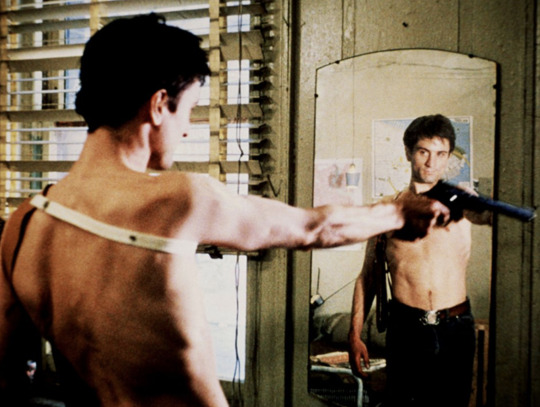
The most famous mirror moment is, of course, Robert De Niro’s in Taxi Driver. In the insomniac voiceover, his Travis Bickle says, “I think that someone should become a person like other people,” showing the character’s alienation from other humans. You aren’t already a person, to Travis: you have to become one. As Travis descends into psychosis, dreaming of 1. impressing the cool blonde (Cybill Shepherd) who rejected him after he took her to a porn movie on their first date and 2. rescuing the child prostitute Iris (Jodie Foster), he begins to amass a small arsenal, putting together boot holsters and straps to go around his wiry body. In the unforgettable moment when he checks himself out in the mirror, he goes into a zone of macho fantasy. (Schrader’s script said only “Travis speaks to himself in the mirror.” De Niro’s “You talkin’ to me” was his improvisation.) De Niro goes so far into his sense of privacy, it’s almost embarrassing to watch. And yet it’s so human, too. (If you say you’ve never talked to yourself in the mirror, or sung in the shower, you’re lying.)
De Niro’s second mirror moment is Raging Bull’s final scene, when the bloated Jake La Motta recites Marlon Brando’s “I coulda been a contender” monologue from On the Waterfront, before standing up and doing a series of “pumping up” exercises, to get ready to go onstage. (Side note: Mary Elizabeth Winstead closes out Eva Vives’ wonderful 2018 film All About Nina, about a troubled stand-up comic, with a re-creation of the scene from Raging Bull.) What’s fascinating about the Raging Bull scene is that Jake La Motta has no “self” to reveal. It’s almost like there’s no inner life at all. He doesn’t “get it.” He never did, he never will. De Niro blanks himself out in a very unnerving way, opposite to the dangerous vengeful-spirit fantasy he inhabits in Taxi Driver.
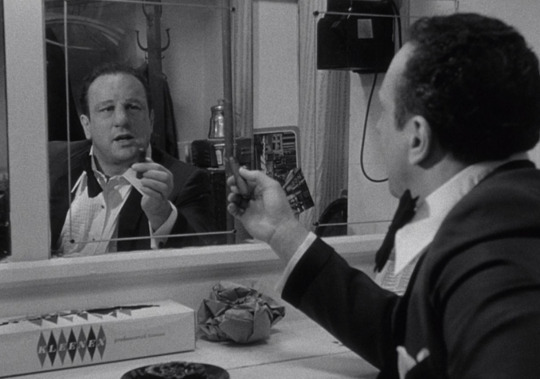
Although Walter Hill’s Johnny Handsome descends into a cliched crime movie with paper-thin characters, the opening sequences are dark, cynical, and atmospheric. Mickey Rourke plays Johnny, a man with a deformed head, an “ugly” appearance which has separated him from other humans. Reminiscent of the Joan Crawford film A Woman’s Face, a caring plastic surgeon (Forest Whittaker) offers to operate on Johnny, to give him a chance at a new life. When Rourke unwraps the bandages and sees his new face (i.e. Rourke’s real face), Rourke has a mirror moment like almost no other, a moment worthy to be placed alongside Brando’s and De Niro’s. He touches his face with wonder, bursting into tears. That’s touching enough, but then, as he glances back at Whitaker, Rourke goes deeper. A look of fear, and lifelong anguish floods his eyes, as he says, “I feel like I still have a mask on” and then, after that, Rourke goes even deeper into a maelstrom of emotion: gratitude, bafflement, awe, despair. The scene is Rourke’s finest hour.
Up until recently (with a couple of exceptions), when women stared at themselves in the mirror in the movies, it was obvious what they are doing: touching up their makeup, checking out their mask. Once again, in the 1960s and 70s, women started doing “mirror scenes” equivalent to men’s mirror scenes, where the purpose was not perfecting the public mask, but to - as Sylvia Plath wrote in her poem “Mirror” - search “my reaches for what she really is.” Faye Dunaway has a great one in Jerry Schatzberg’s Puzzle of a Downfall Child. Gena Rowlands has quite a few “mirror scenes” in the movies she did with Cassavetes (there’s a couple of stunners in Opening Night). In my favorite moment in Sofia Coppola’s The Bling Ring, after breaking into Paris Hilton’s house, Katie Chang goes into a daze of mad-woman fantasy, staring at herself in Paris’ mirror. It’s not hard to imagine the character slipping into the Manson family, if a Manson came along. She’s as blank as Jake La Motta. In La Verite’s opening scene, Brigitte Bardot stares at her face in a broken shard of a mirror, right before marching off for her court date. Her “self” is fragmented, broken. Jennifer Jason Leigh has an extraordinary extended “mirror scene” in Georgia. The moment is everything: self-hatred, rage, searching and longing, and bone-deep narcissism.

Men staring at themselves in the mirror let us into their secret worlds, their fantasies and anxieties, uncertainties and vulnerabilities. It’s not about being self-obsessed. It’s trying to find the self, the self that is not allowed free rein, be it a benign self or a malevolent one.
In Caravaggio’s “Narcissus,” Narcissus leans towards his reflection in the water, his posture pulled downwards with a seductive tug. He braces himself by his hands on the ground, and his knee, bulging out beneath his torso, is the only barrier between Narcissus and his reflection (and, perhaps, drowning). In the painting the reflection below is cut off; all we see are the forearms and that gleaming sturdy knee. Even though Narcissus’ body is barely visible, even though he’s hunched over himself, his energy is childlike, soft and open. He gives his reflection a caressing stare, a swooning look. He yields. This is not just vanity. This is something else.

#musings#film writing#film essay#oscilloscope laboratories#beastie boys#adam yauch#independent film#mirror#taxi driver#robert de niro#Martin Scorsese#american gigolo#fritz lang m#peter lorre#the bling ring#sofia coppola#shakespeare#richard ii#saturday night fever#john travolta#rocky#sylvester stallone#gena rowlands#faye dunaway#marlon brando#reflections in a golden eye#raging bull#jake lamotta#johnny handsome#mickey rourke
43 notes
·
View notes